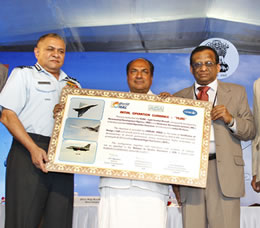

Indian defense officials have given conflicting statements about the country’s long-awaited fighter selection, Aviation Week reporting. At Aero-India, Defense Minister A.K. Antony indicated the final choice on the winning offer will be pushed to March 2012, while Air Force Chief Marshal P.V. Naik saying the selection will be announced as planned in October this year. “This could be the Chief’s way of putting pressure on the government to speed the process as the military is concerned about its reduced squadron strength,” Aviation Week quoted an unnamed Indian official commenting about the apparent dissonance between the Air Force and Defense ministry.
According to one vendor, the last stage for submissions, which includes a review of offset obligations, has yet to occur. While Air Chief Naik indicated price negotiations are likely to begin in a week, vendors are reluctant to enter such negotiations before the defense ministry clarify the transfer of technology clause in an amendment to India’s new defense procurement policy (DPP) expected soon. India’s latest DPP released January 5 did not address these concerns.
By including manufacturing work associated with civil aviation and homeland security toward fulfilling offset obligations, India bowed to pressure from foreign defense vendors, claiming that Indian defense manufacturing base could not cope with the tsunami of offset deals generated by the country’s military imports.
















